Dental Business Guide Podcast Episode | 8th February
Arun Mehra & Nigel Crossman
Financing Strategies for Squat Dental Practices
Starting a dental practice from scratch can feel like a big challenge, especially when it comes to money. However, if you use the right methods, you can create a successful dental practice without spending all your savings. In this guide, we’ll explain the basic ways to get money for new dental practices. We’ll talk about different options like regular bank loans and other ways to get money. We’ll also give you tips to help you make the most of these options.
When you have the right money strategies, you can build a dental practice that will last a long time in your community. So, let’s explore the world of funding for dental practices and see what choices you have.
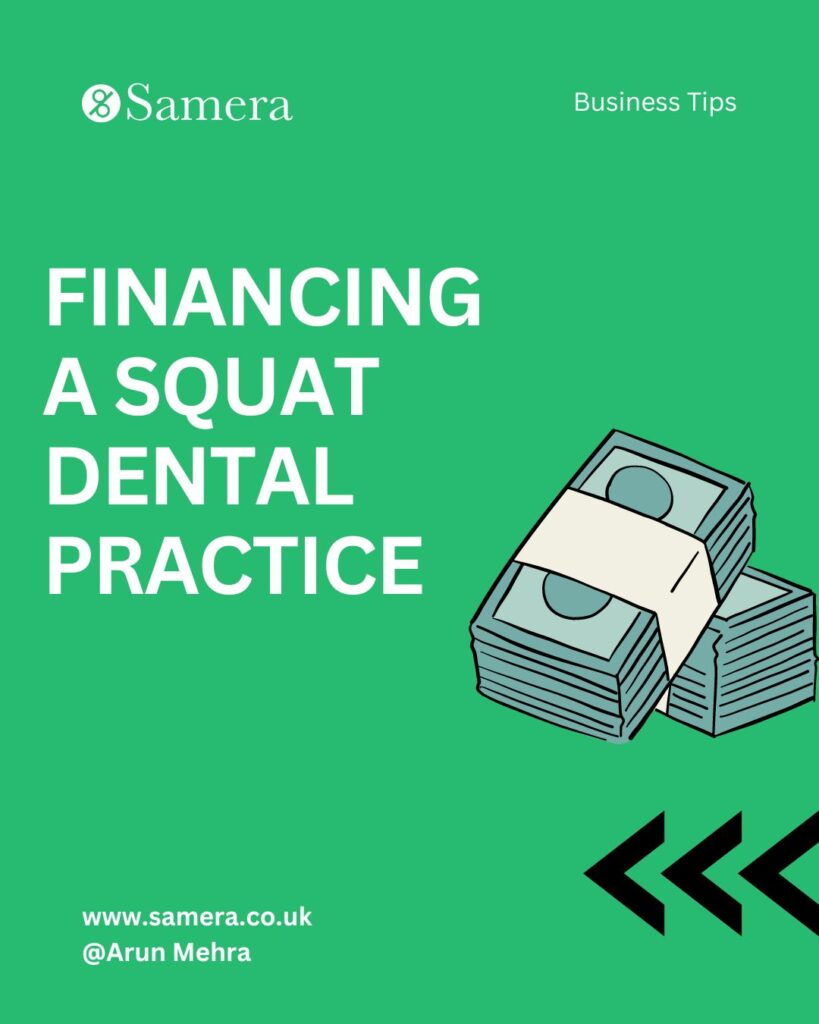
You can read more articles, webinars and podcasts on starting a dental practice on our Learning Centre.
Introduction to squat dental practices
Starting a new dental practice, which is also called a squat practice, is different from established practices in the dental field. These are new practices that are just beginning and they might face a bunch of challenges when it comes to getting the money they need. To understand what’s unique about these start-up practices, it’s important to learn about them.
Starting a dental practice from the beginning needs careful planning, managing money, and knowing how the dental industry works. Start-up practices face challenges like getting money to buy equipment, finding a good place to work, and hiring the right people. They might also have a hard time finding enough patients and making steady money at first. But even though there are problems, start-up dental practices also have chances for dentists to make their practice the way they want and create a special experience for patients. By using smart money strategies, dentists can understand money stuff and make their practice successful over a long time.
The challenges of financing a squat dental practice
Getting money for a start-up dental practice can be really tough. Unlike established practices that already have patients and money coming in, start-ups have to start from scratch. This can make banks more hesitant to lend money because it seems riskier. One big challenge is getting the money you need to start the practice. You have to pay for things like finding a place to work, buying equipment, hiring staff, and advertising. All these costs can be a lot.
Regular banks might not want to lend money to a proposed start-up practice without a good financial history or something valuable to offer if things go wrong. Another challenge is getting patients and making money regularly. It takes time and effort to build a group of patients, and it can be slow when you’re just starting. This can make it hard to pay for ongoing things and pay back any loans or money you borrowed. Also, start-ups might have trouble getting good loan terms. Lenders might ask for higher interest rates or stricter rules because they worry about the risks of a new and uncertain practice.
Contact us to find out more
This can make it hard for the practice to stay strong financially and grow. To handle these challenges, dentists who want to fund a start-up practice should look into different ways to get money. This might mean finding lenders who know about dental practices or looking at options like crowdfunding. It’s also important to have a smart and detailed plan for your business that shows how it can grow and make money. On top of that, building good relationships with dental experts, like suppliers or other dentists, can give you helpful advice and connections that might help you get money or find patients. So, funding a start-up dental practice can be tough under certain circumstances. But with careful planning, different money options, and a strong business plan, dentists can handle these challenges and set themselves up for success in the long run.
Action Plan
Starting a dental practice from scratch, known as a squat practice, presents unique financing challenges. Securing funds for equipment, hiring staff, and marketing can be difficult without an established patient base. Traditional banks may be hesitant to lend to new practices due to perceived risks. Additionally, attracting patients and generating steady income poses challenges initially. Dentists can overcome these hurdles by exploring alternative funding options, such as lenders familiar with dental practices or crowdfunding. A well-developed business plan and strong industry connections are also essential for success. Despite the challenges, careful planning and strategic financing can pave the way for a thriving practice in the long term.
Understanding the different financing options available
When it comes to getting money for your start-up dental practice, it’s really important to know about the different ways you can do it. This knowledge will help you make smart decisions that fit with your practice’s money goals.
One option is to get a regular bank loan. This means you ask banks or other lenders to give you money for your dental practice. These loans usually have set interest rates (either the rate stays the same or changes) and a plan for how you’ll pay it back. It’s really important to look into different loan options and pick the one that works best for your practice.
You can look into options for getting money to buy equipment using asset finance. Dental tools can cost a lot, and there are special ways to get money just for buying equipment. This can help spread out the cost over time, so it’s easier to handle your practice’s money.
For some dental practices, it might be an alternative option to get money to buy an existing practice or make your current one bigger. This is called practice acquisition funding. It gives you the money you need to buy established practices, which helps you switch smoothly and get more patients.
Last but not least, think about private funding or partnerships. People who have money, like family, friends, or other dentists, might want to invest in your practice. This can be another way to get money that fits your situation. Knowing about all these different money options is really important. It helps you make smart choices that work for your startup dental practice’s needs and goals. By looking into each option carefully and talking to money experts, you can get the money you need to make your practice grow and succeed.
Action Plan
When financing a start-up dental practice, several options are available to consider. Traditional bank loans offer a straightforward approach with set interest rates and repayment plans. Asset finance provides specialized funding for purchasing expensive equipment, allowing for manageable payments over time. Practice acquisition funding facilitates the purchase of existing practices or expansion of current ones, streamlining the transition and attracting more patients. Private funding or partnerships with investors, such as family members or fellow dentists, present alternative avenues for securing funds tailored to individual needs. Understanding these diverse financing options empowers dentists to make informed decisions aligned with their practice’s goals, ensuring growth and success in the long term.
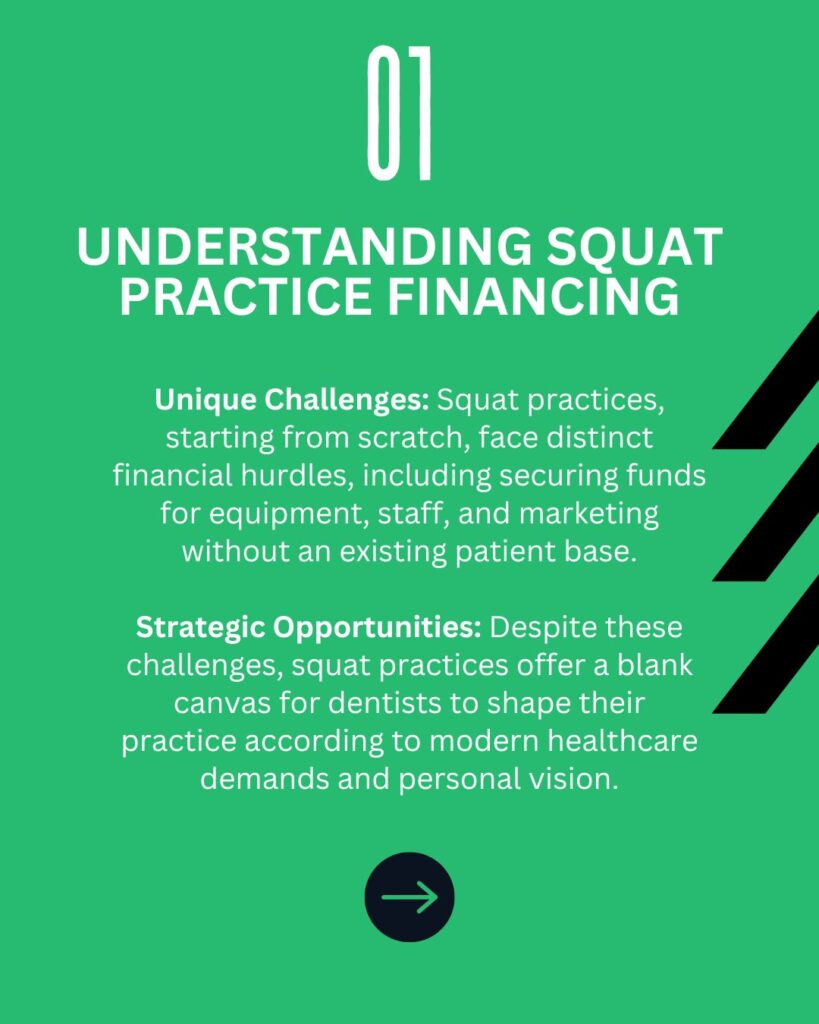
What rates will banks lend at for squat practices?
Lenders will look to assist with finance up to 70% of the build and equipment costs subject to a cap on the maximum loan. They will want to see only one surgery completed fully in a single-handed practice and staff costs kept to a minimum with perhaps a nurse and receptionist at first to keep costs under control.
When reviewing your projections, they will want to see these in a standardised format and they do expect to see losses in the first few months. Be realistic, as lenders will expect you to be.
How much does it cost to start a dental practice?
We can’t give you a specific quote on how much it will cost because in truth, it depends on various factors. These include:
- The location of your site
- The building you’re going to need to acquire for the practice
- What type of equipment you’re going to be putting into the practice
- How many surgeries you are going to be putting into the practice as well as waiting rooms
- How much the building work is going to cost
So, the cost will vary and differ greatly between any two circumstances. You can easily spend anything from £100,000 to £500,000 and quite easily maybe even more in some cases.
But you need to make sure that you have a budget and a business plan that will forecast future trajectories. These forecasts will help you to make an efficient plan to repay all the money you’re going to need to start up your own dental clinic.
The most important thing you need to do before you even start preparing for building work is planning and budgeting for how much it is going to cost.
Traditional bank loans for dental practices
Regular bank loans can be a good way for startup dental practices to get the money they need for different things. These loans come from banks or financial companies and can provide a lot of money to help dental practices with their money needs. One big advantage of regular bank loans is that they’re easy to get. Banks are usually willing to work with dentists to give them the right kind of money for what they need as they (rightly) see the healthcare industry as a safe bet.
This could be money for buying equipment, fixing up the office, getting an existing practice, or just working capital. When you think about a bank loan, it’s important to know about the different kinds. The most common one is a term loan. This means you get a set amount of money and you have to pay it back over a certain time, usually with a fixed interest rate. This helps dental practices plan their money and make regular payments until they’ve paid back the whole loan.
Another kind of bank loan is a line of credit. This gives you a set amount of money that you can use whenever you need it. This can be really useful for dental practices that don’t always make the same amount of money or have costs that change. You only pay interest on the money you use, which can save you money.
To get a bank loan for a dental practice, you have to be prepared. Lenders will look at how well your practice is expected to perform financially, like how much money you make and how much profit you have according to your business plan. You need to have a strong plan for your practice, financial records, tax papers, and any other important papers ready to show the bank.
Even though regular bank loans can be a good way to get money, there are some things to think about. Banks can have strict rules for giving out loans and might need to secure the loan in case things don’t go well. Also, it can sometimes take a while to apply and get approved for a bank loan if you get the business plan or application wrong, so you need to be patient and careful.
So, regular bank loans can give startup dental practices the money they need to grow and run their business. Understanding the different loan options, getting the right documents ready, and being aware of the challenges are important when you’re trying to get a bank loan successfully.
Action Plan
Regular bank loans are a reliable option for startup dental practices to secure financing for various needs like equipment purchases or office renovations. They offer fixed-term loans with predictable payments or flexible lines of credit, allowing access to funds as needed. However, applicants must prepare strong business plans and financial documentation, and be aware of stringent approval criteria and potential delays in the application process. Overall, bank loans provide valuable support for dental practices’ growth and operations.
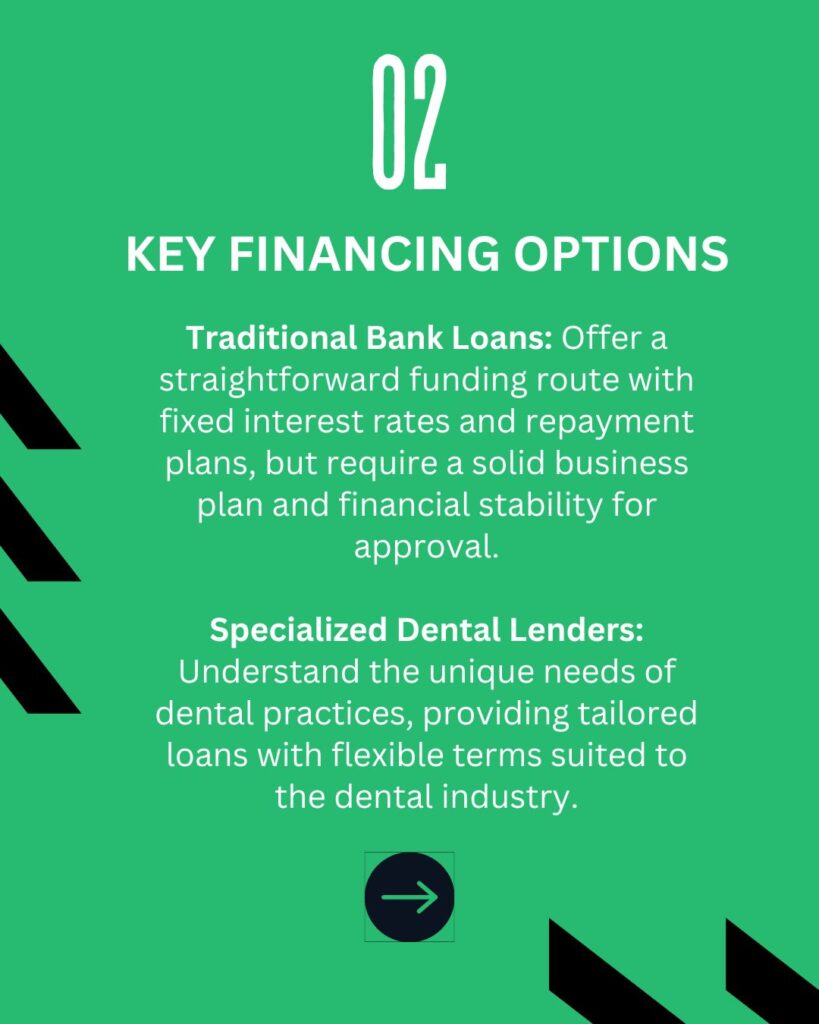
Equipment financing and leasing options
When you’re running a dental practice, having the right equipment is really important. But buying dental equipment can cost a lot of money, especially for new dental practices that are just starting out. This is where equipment financing and leasing options can be really helpful.
Equipment or asset financing lets you spread out the cost of buying dental equipment over time. Instead of paying a big amount upfront, you make regular monthly payments over a set period. This makes it easier for your practice’s budget. You get the necessary equipment without having to pay a lot of money all at once.
Leasing, on the other hand, gives you the chance to use the equipment without owning it completely. With a lease, you pay a monthly fee to use the equipment for a certain time. When the lease period is over, you can choose to renew the lease, upgrade to newer equipment, or give back the equipment. Both equipment financing and leasing have their pros and cons.
Financing lets you eventually own the equipment, while leasing offers flexibility and the option to upgrade when technology improves. Which option you choose depends on what your practice needs and your money situation.
Before you decide on equipment financing or leasing, it’s important to do some research and compare different banks or leasing companies. Look for good interest rates, flexible payment terms, and reputable providers. You might also want to work with a financial advisor who specializes in supporting dental practices. They can guide you through the process and help you make the best decision for your practice. Getting the right dental equipment is crucial for providing good care to your patients. By looking into equipment financing and leasing options, you can overcome money obstacles and make sure your new dental practice has the tools it needs to do well.
Equipment selection for a start-up dental practice
There are many suppliers of dental equipment and whilst you maybe excited about your new venture it’s important you get the balance right. Purchase what you may need, and then perhaps once things are running well, you can purchase some of the extra’s you may desire!
Through the Samera Alliance, our Dental Buying Group, we can help you find excellent equipment on great terms. So make sure when starting out, you join the Samera Alliance if you want the right advice at the right price.
Download our squat practice checklist to make sure you have all the equipment you’re going to need for your new practice:
Here is a list of the consumables our partners in the Samera Alliance suggest every squat practice will need:
Action Plan
Equipment financing and leasing options provide valuable solutions for dental practices facing the high costs of acquiring necessary equipment. With equipment financing, practices can spread out payments over time, easing the financial burden of upfront costs. Leasing offers flexibility, allowing practices to use equipment without full ownership and providing options for upgrades or returns at the end of the lease term. Before deciding, it’s essential to research and compare providers for favorable terms and consult with financial advisors specializing in dental practices to make informed decisions.
Alternative financing options for squat dental practices
When it comes to getting money for a new dental practice, traditional bank loans might not always be the best choice. But don’t worry, there are other ways to get the money you need to start your practice.
- One option is to get help from companies that specialize in giving money to dental practices. These companies know a lot about dental practices and can offer loans with payment plans and interest rates that make sense for the dental industry.
- Another idea is equipment leasing. Leasing means you can use the dental equipment you need without having to pay a lot of money upfront. Instead, you make regular payments over time. This is good for new practices that want modern equipment without spending a lot right away.
- You could also try crowdfunding. This is a way to ask people online to support your healthcare project. There are websites where you can create a campaign and people who believe in your idea can give you money. This can help you raise money and also let more people know about your practice.
- And don’t forget about teaming up with other dentists or investors. Working together with people who have similar goals can bring in money and support for your new practice.
It’s really important to look into all these different ways to get money and see which one fits best for your needs. You might want to talk to a money advisor or someone who knows about dental practices to get advice and make a smart choice.
Action Plan
Alternative financing options cater to the diverse needs of new dental practices seeking funding. Specialized companies offer tailored loans with favorable terms, while equipment leasing enables access to modern tools without hefty upfront costs. Crowdfunding platforms provide opportunities to garner support and funding from backers, and partnerships with other dentists or investors can offer both financial resources and support. Consulting with financial advisors helps practices navigate these options effectively.
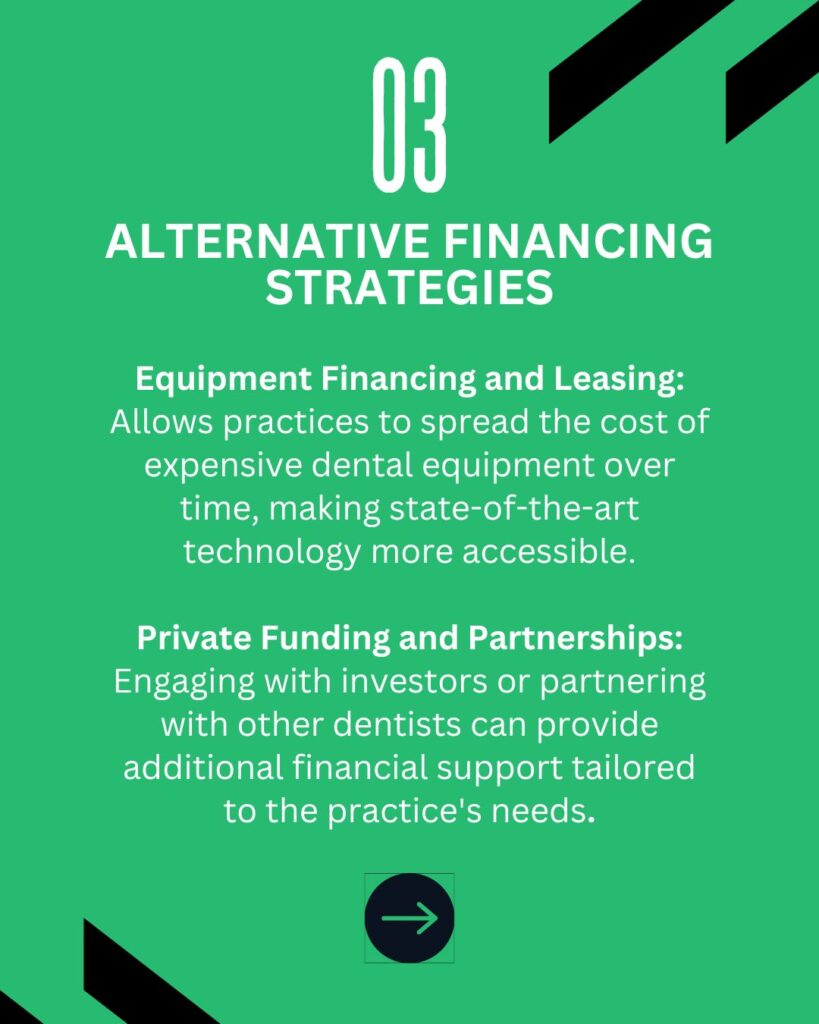
Tips for improving your chances of getting financing approval
When it comes to getting money for your new dental practice, there are some important things you can do to improve your chances of getting approved. These strategies can help you get the money you need to start or expand your practice, so you can provide good dental care to your patients.
- Build a strong credit history: Lenders often look at your credit history when deciding whether to give you money. Make sure you have a good credit score by paying your bills on time, not having too much credit card debt, and avoiding unnecessary loans. If your credit isn’t great, work on improving it before applying for funding.
- Create a detailed business plan: Having a well-prepared business plan shows lenders that you’re serious and knowledgeable. Include detailed predictions about money, research about the market, and clear goals for your business. This will show that you know how to run a practice and handle finances.
- Collect important documents: Banks will need various papers to check how stable and trustworthy you are financially. This might include personal and business tax forms, bank statements, financial reports, and legal documents like licenses and permits. Make sure all these important papers are organized and ready to go to make the application process smoother.
- Get professional advice: Think about talking to a money advisor or someone experienced in the dental industry. They can give you helpful advice and guidance. They’ll help you understand the details of funding and suggest ways to improve your chances of getting approved.
- Explore different funding options: Don’t just stick to regular bank loans. Look into special funding options designed for dental practices, like dental practice loans, equipment financing, or working capital loans. These specific choices might give you more flexibility and better terms for what you need.
By following these tips, you can greatly increase your chances of getting the funding you need to start or grow your new dental practice. Remember, careful planning, a strong credit history, and exploring different funding options are key to boosting your approval chances and setting the stage for a successful dental practice.
Action Point
To improve your chances of obtaining financing for your new dental practice, focus on maintaining a strong credit history, creating a detailed business plan, organizing essential documents, seeking professional advice, and exploring diverse funding options. These strategies will demonstrate your preparedness and increase your appeal to lenders, enhancing the likelihood of securing the necessary funds for your practice’s success.
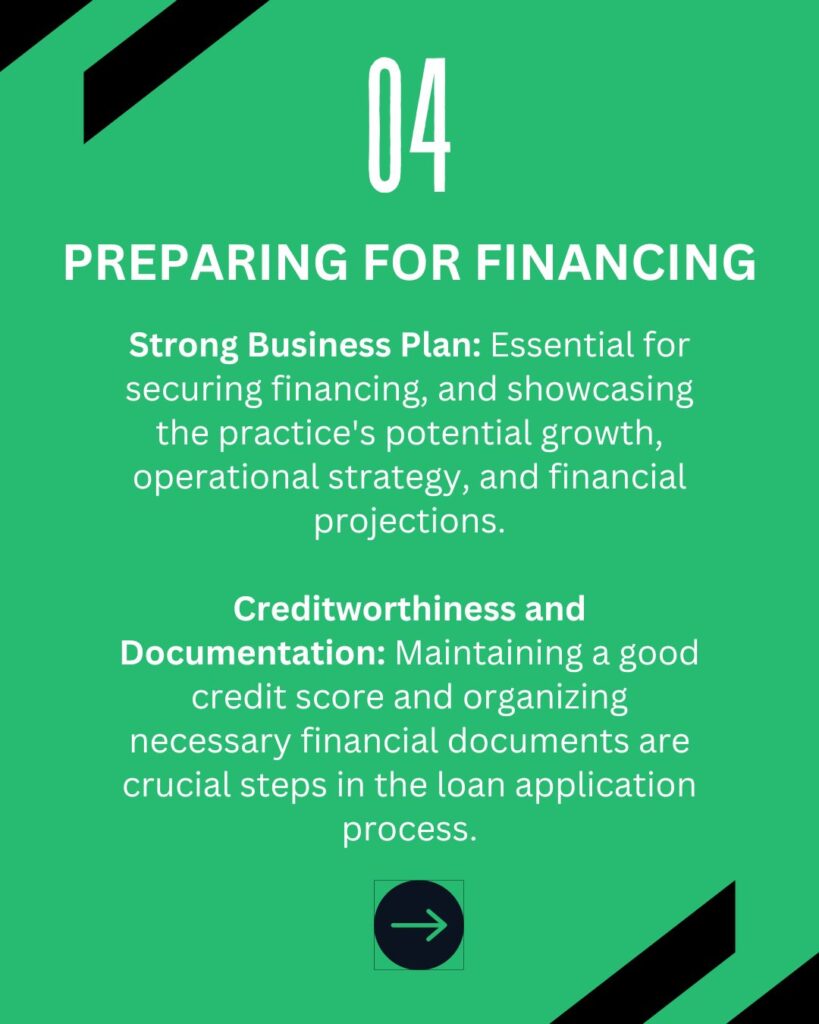
Contact us to find out more
Creating a solid business plan to attract lenders
Creating a strong plan is really important if you want banks to give you money for your new dental practice. A well-made plan shows that you’re skilled and committed to making your practice successful. It also helps banks understand your goals, strategies, and how you expect to make money. When you’re putting together your plan, it’s important to include certain important parts that banks look for.
First, explain your mission, which is what your practice is all about. Then, do a careful study of the market to know who your patients will be, who your competition is, and how your practice can grow. In the money part of your plan, give details about how much it will cost to start your practice. This includes things like equipment, supplies, and the place where you’ll work.
Break down how much money you think you’ll make and spend, including how many patients you’ll see, what you’ll charge, and how much insurance will pay you. Talk about what makes your practice special compared to others.
It’s also important to talk about how you’ll get patients and make your practice grow. Explain your plans for marketing, like using online ads, doing virtual events, working with the community, and partnering with other healthcare providers. Don’t forget to talk about your background, education, and experience. Lenders want to know that you have the skills to run a dental practice well.
Lastly, talk about how you’ll pay back the loan and what you can use as a guarantee. Lenders want to know they’ll get their money back. You can include a plan for repaying the loan, expected money statements, and something valuable you can offer as a promise that you’ll pay. By putting together a strong plan that covers all these things, you’ll make a strong case to lenders and increase your chances of getting money for your new dental practice.
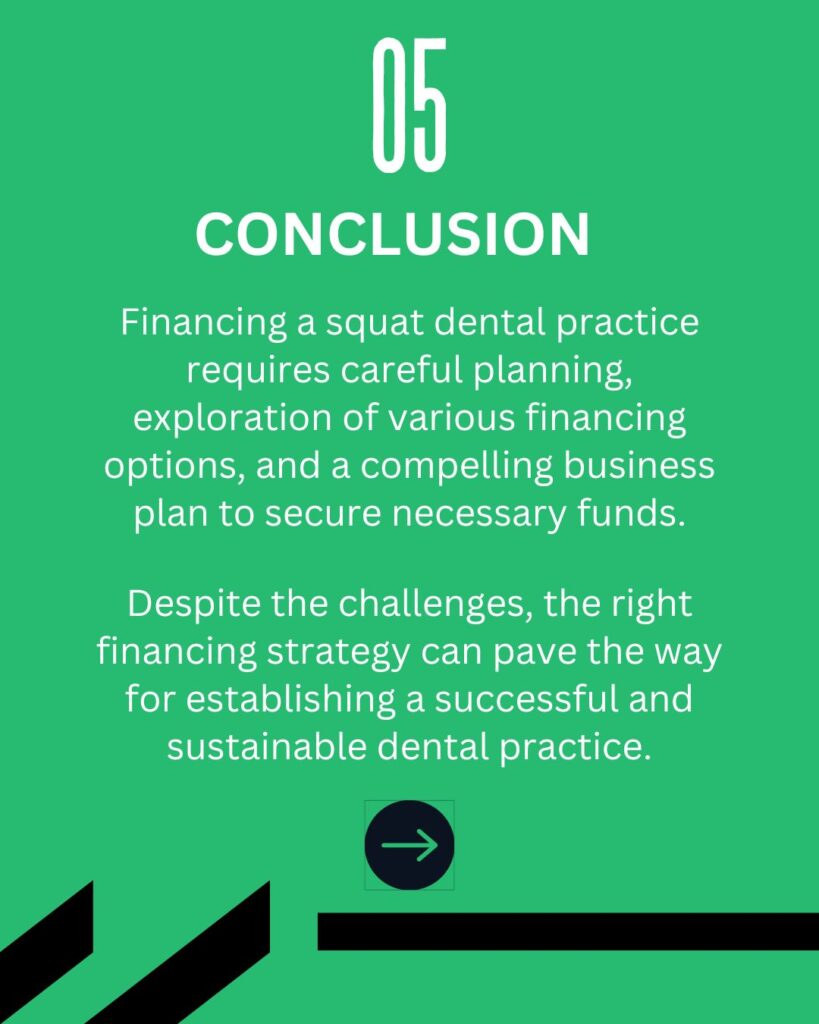
Click here to find out more about building a business plan for a dental practice.
Starting a dental practice can be tough, especially when it comes to getting money. But don’t worry, if you follow the right steps, you can overcome these challenges and build a successful practice. Remember to carefully look at your money options, get advice from experts, and think about different ways to get money. By doing these things, you can build a strong foundation for your new dental practice and get ready for long-term success.
Learn more: Related Articles
About the Author

Neha Jain
Neha Jain is a skilled content writer with a rich background in business and financial knowledge. With a bachelor’s degree in English Literature and Psychology, Neha has honed her writing skills, furthering her expertise with the Content Writing Master Course (CWMC) at IIM SKILLS and a Content Marketing Certification from HubSpot Academy.
Working alongside our business development experts, Neha specialises in helping accountants, dentists and other healthcare professionals start, scale and sell their businesses.
Reviewed By:
Starting a Dental Practice: Get Started
We’ve been helping the UK’s dentists start their own practices for nearly 20 years and we know exactly what it takes to make your practice a success!
Our Dental Practice Start-up Programme is a hands-on consultancy service designed to take you through your whole journey to becoming a dental practice owner. Book a free, no-obligation consultation with one of our team at a time that suits you (including evenings). We’ll call you back and have a chat about how we can help start your dream practice.
Contact us today for all the advice, support and expertise you’ll ever need to start a dental practice.
Learn More: Starting a Dental Practice
For more information please check out the articles and webinars in the start a dental practice section of our Learning Centre, like our guide on How to Start a Dental Practice in 13 Steps.
Make sure you never miss any of our articles, webinars, videos or events by following us on Facebook, LinkedIn, YouTube and Instagram.




